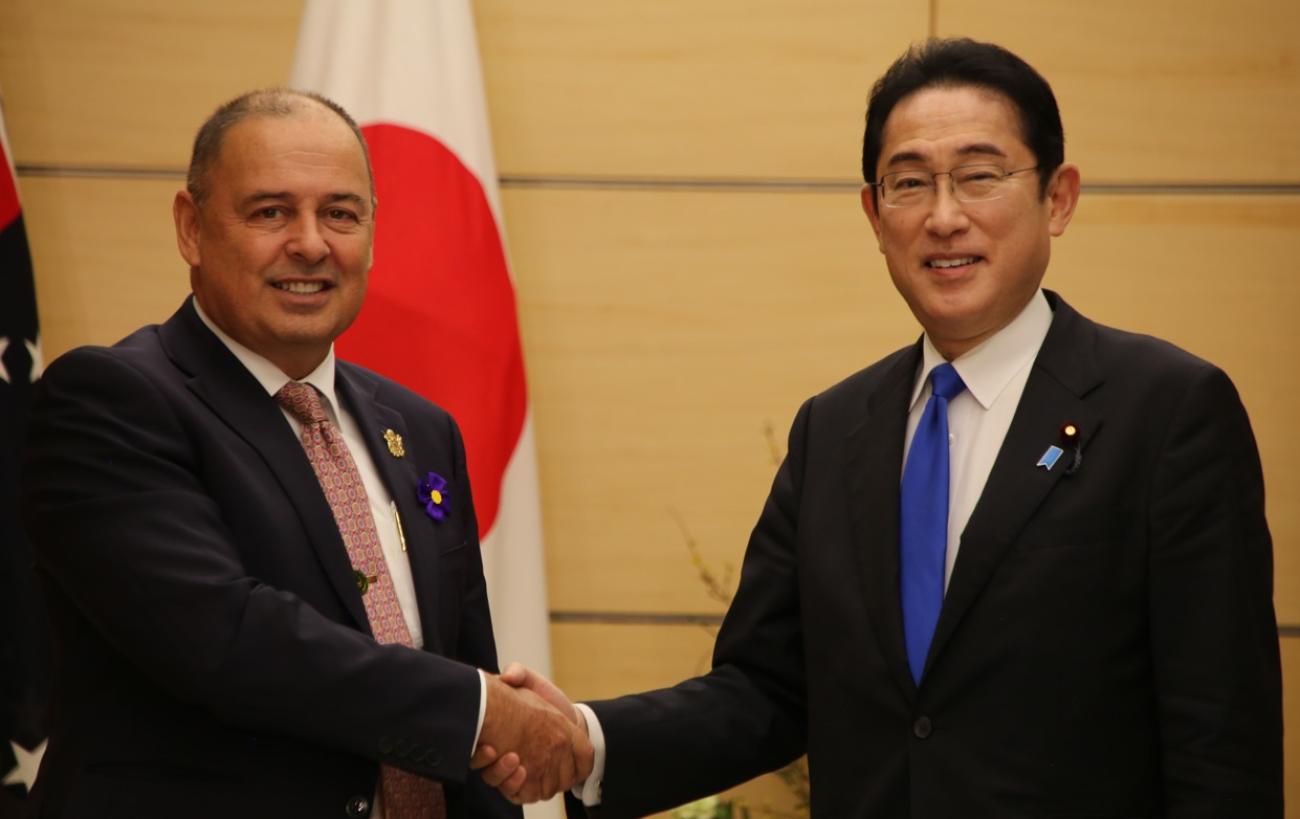Brown confirms International Atomic Energy Agency mission to Rarotonga
Monday 10 July 2023 | Written by Supplied | Published in Economy, National

Cook Islands Prime Minister Mark Brown meets with Japan Prime Minister Fumio Kishida in Tokyo in February. The pair have developed a close relationship and met again at the G7 Summit in Hiroshima in May. 23070904
The Pacific Islands Forum Chair, Cook Islands Prime Minister Mark Brown will receive a high-level mission from the International Atomic Energy Agency (IAEA) led by Director-General Rafael Grossi in Rarotonga today.
The IAEA delegation will present their report on the Safety Review of the ALPS-treated water at the Fukushima Daiichi Nuclear Power Station.
Prime Minister Brown met with the Pacific Island Forum’s Troika and the Secretariat late last week to discuss the forthcoming IAEA visit and the proposed way forward for Prime Minister Brown’s further discussion with all Forum Leaders in the coming week.
“Recognising our strong collective Forum advocacy on this issue to date, and in the spirit of transparency and dialogue, I have invited my colleague Forum Leaders to attend the IAEA presentation through virtual means next week,” said Prime Minister Brown.
Prime Minister Brown acknowledged the support and guidance of the Forum Troika who were represented by the Prime Minister of Tonga, the Hon.Siaosi Sovaleni, and the Assistant Minister of Foreign Affairs of Fiji, the Hon. Lenora Qereqeretabua.
“As a collective, we have maintained from the beginning the importance of international consultation and keeping with international law. We have agreed on the need for decisions that are informed by independent and verifiable scientific assessments, particularly as they relate to the safety of any radioactive nuclear wastewater release into our shared ocean. We also respect the sovereignty of each Member on this complex issue,” said the Forum Chair.
“We have continued to uphold our commitments under the South Pacific Nuclear-Free Zone Treaty (the Rarotonga Treaty), including the prevention of nuclear contamination, whether by direct means or through transboundary impact,” he added.
PM Brown acknowledged the effort by the IAEA to visit our Blue Pacific region in person to present their report findings. PM Brown confirmed that following the IAEA visit and in consultation with the Forum Troika, he would propose a way forward for Forum Leaders consideration that would be respectful of the views of all members.
“As stewards of the Pacific Ocean, it is incumbent upon us to leave no stones unturned in our collective effort to leave behind for our future generations a healthy and resilient ocean.”
Meanwhile, a plan to release treated radioactive water into the ocean is safe and there is no better option to deal with the massive buildup of wastewater collected since the 2011 Fukushima nuclear disaster, the head of the United Nations’ nuclear watchdog, Grossi, told has media.
Japan will release the wastewater sometime this summer, a controversial move 12 years after the Fukushima nuclear plant meltdown. Japanese authorities and the IAEA have insisted the plan follows international safety standards – the water will first be treated to remove the most harmful pollutants, and be released gradually over many years in highly diluted quantities.
But public anxiety remains high, including in nearby countries like South Korea, China and the Pacific Islands, which have voiced concern about potential harm to the environment or people’s health. On Friday, Chinese customs officials announced they would maintain a ban on food imports from 10 Japanese prefectures including Fukushima, and strengthen inspections to monitor for “radioactive substances, to ensure the safety of Japanese food imports to China.”
Speaking in an interview during a visit to Tokyo Friday, Grossi said that while fears over the plan reflect a “very logical sense of uncertainty” that must be taken seriously, he is “completely convinced of the sound basis of our conclusions.”
“We have been looking at this basic policy for more than two years. We have been assessing it against … the most stringent standards that exist,” he said. “And we are quite certain of what we are saying, and the scheme we have proposed.”
Grossi told CNN he had met with Japanese fishing groups, local mayors and other communities affected by the 2011 disaster – and whose livelihoods may be hurt by the release – to listen to those concerns.
“My disposition … is one of listening, and explaining in a way that addresses all these concerns they have,” he said.
“When one visits Fukushima, it is quite impressive, I will even say ominous, to look at all these tanks, more than a million tons of water that contains radionuclides – imagining that this is going to be discharged into the ocean. So all sorts of fears kick in, and one has to take them seriously, to address and to explain.
“This is why I’m here, to listen to all those who in good faith have questions and criticism and question marks, and to address them.”
On Tuesday last week, Grossi formally presented the IAEA’s safety review to Japanese Prime Minister Fumio Kishida. The report found the wastewater release plan will have a “negligible” impact on people and the environment, adding that it was an “independent and transparent review,” not a recommendation or endorsement.
Japanese authorities have said the release is necessary because they are running out of room to contain the contaminated water – and the move will allow the full decommissioning of the Fukushima plant.
The 2011 disaster caused the plant’s reactor cores to overheat and contaminate water within the facility with highly radioactive material. Since then, new water has been pumped in to cool fuel debris in the reactors. At the same time, ground and rainwater have leaked in, creating more radioactive wastewater that now needs to be stored and treated.
That wastewater now measures 1.32 million metric tons – enough to fill more than 500 Olympic-sized swimming pools.
The IAEA delegation will arrive in Rarotonga today and is due to depart tomorrow.














































